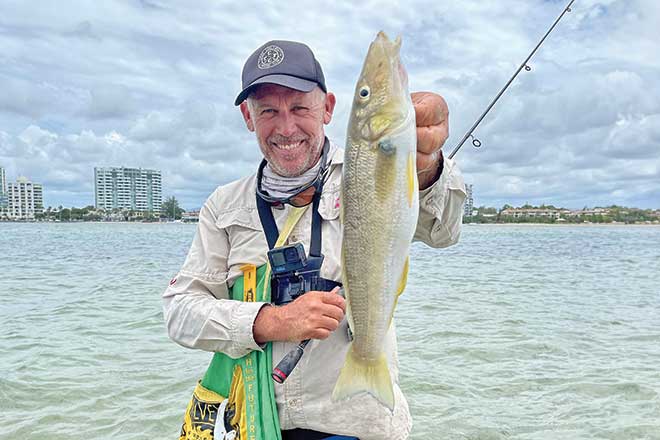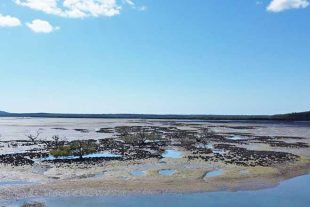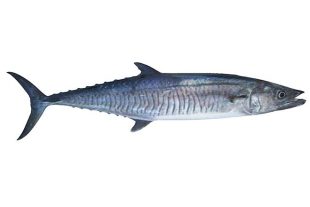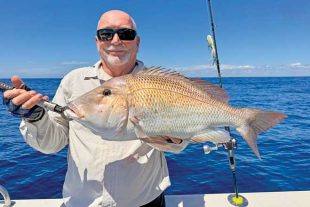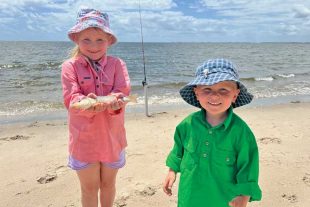Hi everyone, what a long and hot summer it was.
Many of us have been looking forward to the cooler weather and it has finally arrived.
The long-term average temperature range on the Gold Coast for April is a comfortable 17-26C.
In the coming months, from June to November, lures come into play a lot on my daily charters when we’re targeting a big variety of fish and squid.
This month however, I’ll be getting back to basics with some tips for catching heaps of fish on the humble but amazing saltwater yabby.
The Gold Coast Broadwater has some of the best yabby banks in Australia.
We are very fortunate to have such an abundance of them, which means no shortage of bait for anglers.
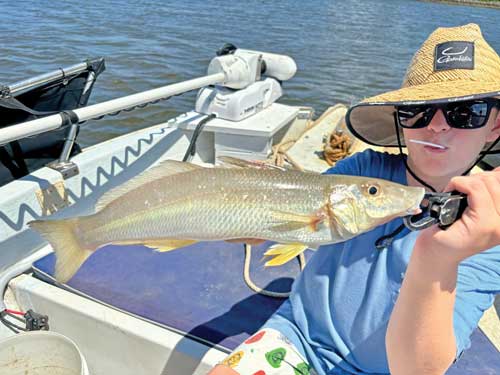
I always say it’s impossible to not catch fish on yabbies, they never fail.
Have a look at the map I’ve marked in this article for the best spots to pump, all very close to the major boat ramps in southern Broadwater.
A decent yabby pump helps, and I’ve found that Alvey’s is the best.
Around a low tide is the easiest time to pump yabbies.
Look for soft clean sand and lots of holes.
A floating sieve helps pump in deeper water and puddles.
Always pump the same hole three or four times until you get deep enough to reach the bigger yabbies.
Then move a few metres and start again.

You should get two to six yabbies every few metres.
Yabbies do not like heat, so keep them cool in shade and change the water in their bucket as often as possible.
If you can’t get yabbies, live beachworms work well too – you can buy them from Aqua Adventures at Southport.
To anchor or drift?
I get asked this question often.
It really depends.
If the wind and tide allow, I’ll often start by drifting until I find fish then anchor.
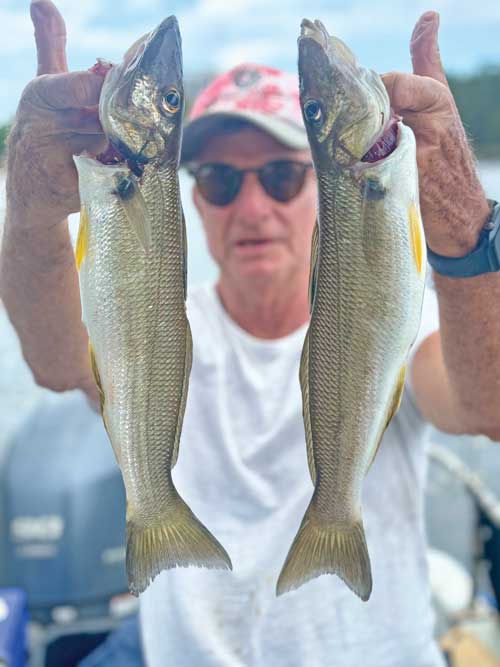
If there are no bites, I never stay anchored in one spot for more than 10 minutes, or 20 minutes if we are getting only small bites.
When searching for fish I move only 100-200m at a time until I find bigger fish.
My favourite depth for big whiting, trevally, bream, tarwhine, flathead and grunter is 1-3m throughout Broadwater and up the Nerang River.
Generally, the more rain there is and during summer, the fish are further downstream from Bundall to Southport.
During drought and cooler months, they can be found from Capri to Carrara.
Fish like a run to feed – no run, no fun.
You’ll find the best bite periods coincide with tidal flow.
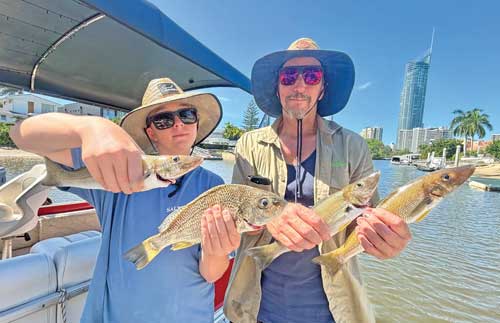
During big tides, around the inside of big bends work well and, during neap tides, sit out wider to get better flow and therefore fish.
After a big rainfall, a run-in tide is best and, during dry periods, a run-out is better, day or night.
If you have a fish finder, areas with an undulating sandy bottom are good.
When the tide is running, you’ll see the water rippling in these areas.
Getting back to simple fishing methods is one of life’s greatest pleasures.
Even better if you catch a fresh feed of fish for dinner.
Anchoring is easy and effective.
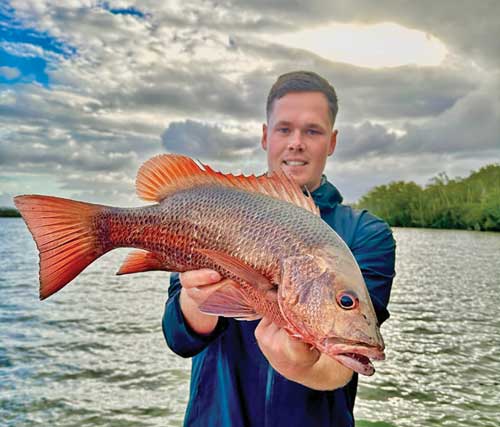
My favourite rods for anchoring and using yabbies for these species are the Shimano Maikuro II 762 1-3kg whiting rod and the Atomic Arrowz Whiting Tip.
As they have soft tips, I find these perfect for whiting.
Big whiting don’t get big by being the stupidest fish in the sea, so it’s essential to fish lightly for them.
The setup includes these rods with 2500 sized reels, spooled with 10lb Platypus Platinum Line, a 3 or 4 sized ball sinker, a small swivel tied to at least a 1m long 6lb fluorocarbon trace, then the hook.
My favourite hook for fishing with yabbies for big whiting and other species is the size 2 Mustad Fine Worm Baitholder.
Always be fussy about how you present the yabbies on the hooks.
This makes a big difference to the quality of fish you will catch.
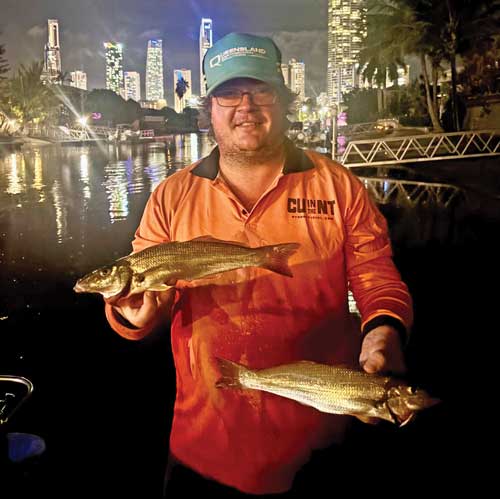
Slide the point of the hook through the tail and underside of the yabby, gently slide the yabby over the hook, then push the point back out when you reach close to the legs and head.
Then hold onto the point of the hook and gently slide the yabby tail over the eye of the hook and up the leader, so that half the yabby is on the hook and the tail half is on the leader.
The whole yabby should be lying straight.
This looks more natural in the water and stops the bait from spinning and twisting the line.
Another big tip is to cast the yabby at varying distances when anchored, as the fish can often be right under the boat.
It is uncanny how often you can be holding the rod and waiting for a bite with none coming, then as soon as you put the rod down… it gets a bite.
This isn’t best way to catch whiting.
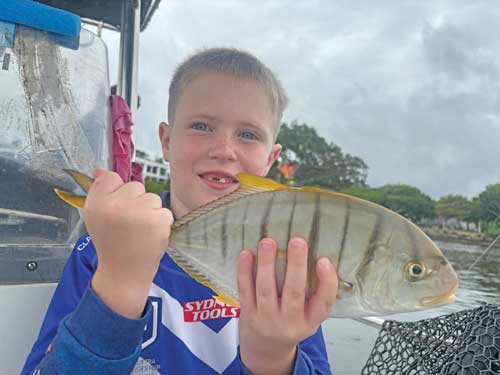
Put the rod down and do not strike until they have crushed the bait, swallowed and start to move off, otherwise you will miss a lot of big fish.
When the tide is running, cast straight out the back of the boat while anchored and allow enough length in the line to keep the bait on the bottom.
Leave the yabbies for five minutes at a time, then wind in to check the bait and cast again.
Leaving them too long will result in hooking stingrays.
If you aren’t catching fish, keep moving!
Don’t be lazy – results require effort.
I hope these tips help.
Let me know how you go.
You can buy a lot of the tackle I use at Sporty’s Fishing in Bundall.
At the Tweed River, Brad Smith will be catching heaps of nice flathead on lures this month, as well as mulloway and trevally.
To book on a charter with myself or Brad, or if you have any fishing related questions, visit goldcoastrivercharters.com, SMS 0432 990 302 or email fishingwithclint@gmail.com, or find us on Facebook at Brad Smith Fishing Charters.
 Bush ‘n Beach Fishing Magazine Location reports & tips for fishing, boating, camping, kayaking, 4WDing in Queensland and Northern NSW
Bush ‘n Beach Fishing Magazine Location reports & tips for fishing, boating, camping, kayaking, 4WDing in Queensland and Northern NSW

